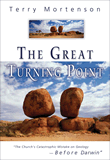That Was Then; This Is Now
The truth is that a proper understanding of creation and the other historical accounts outlined in the book of Genesis are foundational to the entire body of Christian doctrine.
“That was then; this is now,” “I just preach Jesus, love, and prayer. Who cares about all this ‘origins’ stuff? It’s irrelevant!”
These were two of the responses I received when calling Portland-area pastors recently to invite them to attend one of AiG’s two Christian Leaders Meetings (CLMs), which were held in advance of this weekend’s Answers in Genesis Family Conference here in Portland (November 5–6).
Unfortunately, their attitude is typical of a large percentage of pastors and church leaders (and hence of the majority within their congregations as well). In fact, one local church that had originally agreed to have AiG president Ken Ham speak on the Sunday following the conference withdrew their offer after certain elders convinced the rest of the leadership that the issue of origins is too “divisive.” (Would that be origins in general, or just that variety which maintains a high view of biblical credibility and authority?)
The truth is divisive. We must be ‘divisive’ for the right reasons, of course, but Jesus Christ Himself came to divide.
When I interviewed Ken for the In the Beginning radio program last month, I asked him how he felt about the criticism that “focusing on origins is divisive.” Here’s how he responded: “Yes it is! The truth is divisive. We must be ‘divisive’ for the right reasons, of course, but Jesus Christ Himself came to divide.”
Ken added: “When Jesus said ‘I am the way, the truth, and the life
…’ and ‘… you must be born again
…,’ those were divisive statements. When you have a world where men love darkness rather than light, you expect light to divide when it shines into darkness. We don’t stop speaking the truth just to avoid division with those who have compromised the truth of God’s Word to try to accommodate the world and its false scientific claims.”
Thankfully, not all of the pastors who were invited to the Portland breakfast and lunch were unreceptive. In fact, both meetings were very well attended (166 and 82 leaders, respectively) and, Lord willing, these Christian leaders have been enthusiastically promoting this weekend’s conference to their churches. Still, why is it that a straightforward view of Scripture has become so unpopular among today’s Christians?
Throughout most of the church’s history—almost two millennia—the Holy Bible was respected in Western nations. With relatively few exceptions, there was no question among church leaders as to the interpretation of passages where the intended meaning was so obvious and clear (i.e., “… in six days the Lord made heaven and earth
…”,1 “And the waters prevailed exceedingly upon the earth; and all the high hills, that were under the whole heaven, were covered,
”2 etc.).
The truth is that a proper understanding of creation and the other historical accounts outlined in the book of Genesis are foundational to the entire body of Christian doctrine. How did we come to the place where the majority of Christendom thinks otherwise … and to even broach the subject of origins at all is as likely as not to generate either a glassy-eyed stare or sometimes outright hostility?
Sadly, as Ken Ham said on the broadcast, to shine the light of truth in a dark world will result in the separation of those who are willing to compromise from those who are not. But we’re not talking about shining the light in the world here, but rather, in the church, a large portion of which has moved toward the world and away from God’s Word.
Why? In part it’s because many church leaders have been deceived into believing that science has supposedly produced hard evidence controverting the traditional and straightforward understanding of Scripture. This “science” on its own, however, would have been insufficient to bring about this paradigm shift had it not been mingled with an anemic faith within the church that has been encouraged by “philosophy and vain deceit
” Colossians 2:8. (i.e., relativism, higher criticism, etc.), and the propensity for sinful rebellion which we all share (“The heart is deceitful above all things, and desperately wicked: who can know it?
”3).
Once the compromise over biblical authority began in the church and society, it became “natural” to think of the subject of origins as of secondary importance at best … and better left to “the scientists.” It staggers the mind to think that this trust by church leaders was being placed in the hands of people with openly materialistic a priori assumptions—i.e., they begin their “science” saying, “We can’t allow there to be God … never mind the truth. Never mind what is real and right.”
What has been the fallout as a result of this church compromise? About 70% or more of Christian young people abandon their faith by the time their skeptical college professors get through reprogramming their thinking and “setting them straight” regarding the “facts” of science as compared with the “quaint religious myths” they grew up on. Meanwhile the church has fallen into a spiritual coma and is so far down the road of compromise—so busy with its mission of being “culturally relevant” and “seeker-sensitive”—that any substantive distinctions between it and the prevailing culture are fast disappearing.
If we have any hope of reaching the world, we had best wake up and remember the scriptural mandate to remain distinct from the culture around us—firmly grounded like a beacon of light on the Rock of Truth—so that the world can look to us and see a point of reference and the way to Heaven. If, as the pastor said, we should “preach Jesus,” then let us heed Jesus’ own words: “Ye are the salt of the earth … Ye are the light of the world.
” Matthew 5:13-14. Let us not forget that Jesus quoted frequently and freely from Scripture, and at that time, Scripture consisted entirely of the Old Testament.
Let us realize that before Jesus became Saviour, He was the Creator. Christ is the foundation, not just of the church, but of the whole of creation. As Dr. Henry Morris has said, “He is the author, the finisher, the head, the Alpha and Omega, of everything. We need to preach Him as He really is.”4
Christians need a “spiritual defibrillation” to snap us out of the coma of unbelief so that we can once again take God’s Word seriously. We must really believe the Bible and see it—and not “science”—as the arbiter of truth.
For details on this weekend’s major conference in Portland, Oregon, featuring Ken Ham, Dr. David Menton and Buddy Davis, go to our Portland events listing.
is the host of In the Beginning, a weekly radio broadcast in Portland, Oregon, USA dealing with the topic of origins from a biblical, young-earth, creation-based perspective. In the Beginning airs Tuesday and Friday at 5:00 p.m. and Saturday at 4:00 PM on AM 1330 KKPZ.
Footnotes
- Exodus 20:11.
- Genesis 7:19.
- Jeremiah 17:9.
- When Christians Roamed the Earth, Master Books, p. 20.
Recommended Resources

Answers in Genesis is an apologetics ministry, dedicated to helping Christians defend their faith and proclaim the good news of Jesus Christ.
- Customer Service 800.778.3390
- © 2024 Answers in Genesis






